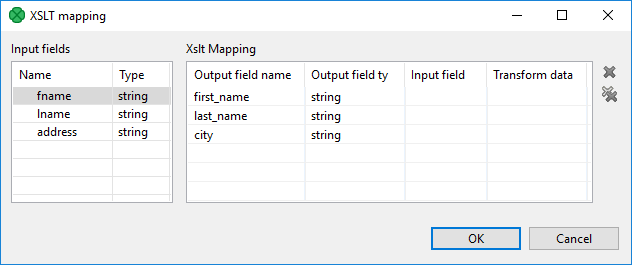XSLTransformer

| Short Description |
| Ports |
| XSLTransformer Attributes |
| Details |
| Best Practices |
| See also |
Short Description
XSLTransformer transforms input data records using an XSL transformation (XSLT 1.0 and XSLT 2.0 are supported).
| Component | Same input metadata | Sorted inputs | Inputs | Outputs | Java | CTL | Auto-propagated metadata |
|---|---|---|---|---|---|---|---|
| XSLTransformer | - |  | 0-1 | 0-2 |  |  |  |
Ports
| Port type | Number | Required | Description | Metadata |
|---|---|---|---|---|
| Input | 0 |  | For input data records | Any1 |
| Output | 0 |  | For transformed data records | Any2 |
| 1 |  | For rejected data records | Input 0 with fields named errorMessage and rejectedField |
Metadata
XSLTransformer does not propagate metadata to the output port 0.
Metadata on the output port 1 must include two string fields named errorMessage
and rejectedField. These fields receive the information about the error
that has occurred.
Metadata on the output port 1 may contain any number of fields from input (same names and types). Rejected record is then copied to the output port 1, together with the error information.
XSLTransformer Attributes
| Attribute | Req | Description | Possible values |
|---|---|---|---|
| Basic | |||
| XSLT file | [1] | External file defining the XSL transformation. | |
| XSLT | [1] | XSL transformation defined in the graph. | |
| Mapping | [2] |
A sequence of individual mappings for output fields separated from each other by a semicolon.
Each individual mapping has the following form:
| |
| XML input file or field | [2][3] | URL of file, dictionary or field serving as input. | |
| XML output file or field | [2][3] | URL of file, dictionary or field serving as output. | |
| Advanced | |||
| Create directories |
If set to | false (default) | true | |
| Output charset | Character encoding of the output. | UTF-8 (default) | other encoding | |
[1] One of these attributes must be set. If both are set, XSLT file has higher priority. [2] One of these attributes must be set. If more are set, Mapping has the highest priority. [3] Either both or neither of them must be set. They are ignored if Mapping is defined. | |||
Details
The XSLTransformer component does XSL transformation of an input and writes the transformation result to the output. The input and output can be specified by a file URL, dictionary or field. The XSL transformation can be loaded from an external file or defined in the component.
Mapping
Mapping can be defined using the following wizard.

Figure 56.6. XSLT Mapping
Assign the input fields from the Input fields pane on the left to the output fields by dragging and dropping them in the Input field column of the right pane. Select which of them should be transformed by setting the Transform data option to true. By default, fields are not transformed.
The resulting Mapping can look like this:
$0.first_name:=transform($0.fname);$0.last_name:=$0.lname;$0.city:=$0.address;
Remember that you must set either the Mapping attribute, or a pair of the following two attributes: XML input file or field and XML output file or field. These define the input and output file, dictionary or field. If you set Mapping, these two other attributes are ignored even if they are set.
Best Practices
We recommend users to explicitly specify Output charset.
